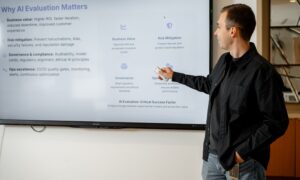How Will AI Replace Coders or Developers?
As the role of AI in the tech industry continues to evolve, we asked seven professionals, including software engineers and CEOs, “How will AI replace coders or developers?” From the perspective that AI augments, not replaces developers to the idea that AI empowers non-technical employees, but developers are still needed, this article provides diverse insights into the future of coding and development in the age of AI.
- Augmenting but Not Replacing Developers
- Providing a Complementary Tool for Developers
- Being a Supportive Partner in Coding
- Reshaping Roles, Creating New Opportunities
- Accelerating Coding but Can’t Replace Human Skills
- Shifting Focus to Developers’ Soft Skills
- Empowering Non-Technical Employees but Developers Still Needed
Augmenting but Not Replacing Developers
AI is unlikely to replace developers entirely because of the complexity, creativity, and human-centric nature of software development. Developers possess problem-solving skills, adaptability to evolving technologies, and the ability to make ethical decisions.
AI can assist with routine tasks, code suggestions, and learning, but it lacks human intuition, context understanding, and emotional intelligence crucial for effective communication, collaboration, debugging, and user-centered design.
The symbiotic relationship between developers and AI is expected to focus on augmentation, enhancing productivity, and improving software quality while preserving the unique abilities of human developers.
Jostin Akkara, Software Engineer, Cubet
Providing a Complementary Tool for Developers
AI won’t replace developers as a whole, and their profession will not fade away. AI will always be complementary to day-to-day developers’ work, but not a complete replacement.
For straightforward and very typical software application modules, AI will do the work better and faster than developers. AI will generate ready-to-integrate application modules and complex components that will require minor adjustments from the developer to integrate into bigger software.
ChatGPT, GitHub Copilot, and other tools are already doing a great job here—for example, AI assistants are very well-suited to writing tests for the production code. AI tools are also super-charged search tools. Instead of browsing for a reasonable amount of time seeking a solution to a problem, AI can give the potential solution in a matter of seconds. So, copy-pasting from Stack Overflow will be replaced with copy-pasting from AI chat.
Veaceslav Gaidarji, CTO, Orangesoft
Being a Supportive Partner in Coding
AI’s impact on coding will be nuanced. While it might replace certain routine tasks for less-experienced coders, it holds immense benefits for experienced ones. AI can handle repetitive tasks like code generation and error spotting, freeing up seasoned developers to focus on innovation and problem-solving.
For beginners, AI is a boon, simplifying the process of project creation. With AI-powered tools offering code suggestions and identifying mistakes, newcomers can learn and build with greater ease. This democratization of coding lowers barriers to entry and encourages exploration.
In essence, AI serves as a supportive partner in coding endeavors. It will reshape roles, making them more dynamic. The experienced will thrive, the beginners will flourish, and together, we’ll explore new dimensions of technological possibilities.
Asim Rais Siddiqui, Co-Founder and CTO, Tekrevol
Reshaping Roles, Creating New Opportunities
AI, exemplified by ChatGPT, is poised to transform coding by automating routine tasks like generating boilerplate code and debugging. While it won’t fully replace developers, it will reshape their roles.
Developers can focus on intricate application architecture, cybersecurity, and strategic problem-solving, areas where AI currently lags. This shift could give rise to new job roles, like prompt engineering, centered on optimizing AI interaction.
Moreover, the integration of AI will elevate the demand for developers skilled in data science, enabling them to design and test applications using data-driven approaches. In essence, AI will augment developers’ capabilities, allowing them to tackle higher-level challenges while coexisting with AI in a symbiotic relationship.
So, AI tools’ capabilities for coding tasks will surely redefine developer roles, focusing on complex architecture and strategic problem-solving. But it is very unlikely that AI will completely replace developers.
Vipul Jain, WordPress Developer Trainee, UpInFifty
Accelerating Coding but Can’t Replace Human Skills
As a software engineer for over 20 years, including developing over 100 apps in the last decade, I recognize AI’s potential to accelerate coding, but don’t see it replacing developers anytime soon.
While AI can generate code snippets, it lacks the contextual knowledge to make those snippets work seamlessly. For example, I’ve tested GitHub Copilot and found it suggests code that often doesn’t integrate well with the broader codebase or architecture. Developers need to understand the whole picture to make appropriate technical choices—AI currently doesn’t have that skill.
Ultimately, AI lacks human judgment, creativity, and wisdom that comes from experience, like my over 20 years as an engineer. It can help developers work faster by suggesting code, but developers are still needed to decide which suggestions work, debug issues, understand changing customer needs, and innovate. AI will augment developers, not replace them.
Mona Kirstein, Ph.D., Digital Strategist, Holistic Coach and Consultant, The Wholehearted Path
Shifting Focus to Developers’ Soft Skills
It won’t replace them so much as force them to focus on skills that currently are not particularly seen as a top priority. Coders will need to focus on soft skills to set themselves apart, as a lot of work currently done by people will be replaced by AI, and the human element will need to come to the front more and more to justify the value in hiring human developers.
This is largely going to impact juniors rather than seniors, whose roles are going to be much harder to automate, but it will most definitely shift career progression for everyone in the long run.
Kate Kandefer, CEO, SEOwind
Empowering Non-Technical Employees but Developers Still Needed
Right now, a non-technical employee will have a developer code something to help that employee in their job functions. With AI and no-code tools, the employee can just create the application, workflow, or program themselves. Coders and developers will still have their place working on more complex projects, but when someone in the business needs something done more efficiently, they’ll be able to build it themselves—with no code at all!
Mark Varnas, Principal SQL Server DBA and Consultant, Red9
Related Questions
- What Do the Top Software Engineers Do that Others Don’t?
- What Are the Risks of Artificial Intelligence?



































